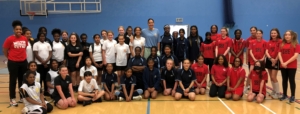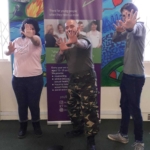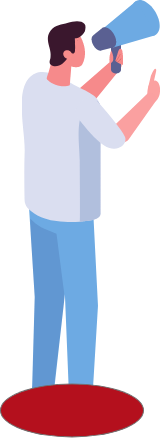Sport England invested in Leap to support programmes that tackle inequalities that children and young people face when accessing a range of physical activities. We believed that we could do more than simply invite funding bids from local organisations, so we tried a different approach.
Partnerships to increase opportunities and participation in physical activity
Leap’s experience, across a wide range of community activities and sports provisions, has made us aware that the best outcomes demand more than a pot of money. Monitoring and evaluation have shown that collaboration, connections and shared expertise are at the core of the most successful and sustainable projects.
Our team hold a wealth of knowledge and contacts that can be used to resolve challenges in more effective ways than simply throwing money at them. It takes a little creative thinking and bringing the right people together, but the outcomes can be beneficial to all involved.
For this reason, we decided that the best way to increase opportunities for children and young people to participate in physical activity was not to simply open up funding bids for a share of the Sport England money. Instead, we invited organisations to contact us if they were interested in developing collaborative partnerships.
Tackling inequalities in access to community sport provision
A great example of where contacts have proved preferable to funding occurred with Transitions UK.
This organisation offers mentoring and support for young people who have reached an age where they are leaving care or SEND provision. Gaining independence for the first time should be exciting, however, these young people lack the support networks to help them adjust.
Transitions UK contacted us to say that isolation and a lack of self-esteem and confidence was an issue for many of the young people they support. This, along with a limited income, was a barrier to individuals getting active.
Their idea was to offer a free or subsidised gym membership to encourage them out. Not only would this increase participation in physical activities, but it could also provide structure to their day and social interaction. Imagine the confidence boost if they enjoyed the exercise and noticed positive changes in their health and wellbeing!
We were fully supportive of this plan. We could see how providing gym membership would help tackle inequalities for young people who have not had the easiest start in life. However, simply funding gym membership is not sustainable, so we wanted a plan with the potential to continue.
Connecting with the Gym Group
Aware that the Gym Group had a gym close to the young people being mentored by Transitions UK, and that they offered relatively low-cost membership, we got in touch with the manager. In conversation, she said that it was part of their plan to keep prices low, so they were an affordable community resource.
When we shared the idea put forward by Transitions UK she was keen to be involved. Initially, The Gym Group offered free 6-month membership to four young people in the current Transitions UK cohort.
There was no pressure on the individuals to attend, yet no cost if they decided to go along and give it a try. They took up this opportunity and made the brave step to head to the gym for the first time. Their feedback suggested that the instructors had been positive and welcoming, which encouraged the three males to return regularly. Unfortunately, the female in the group couldn’t be convinced to return; it isn’t right for everyone.
As there had been successes within this trial, The Gym Group decided to replicate the scheme for young people in High Wycombe. This partnership has proved a positive way for The Gym Group to demonstrate their community values. It also means that Transitions UK has a way to support young people to keep active and social during the early stages of independent living.
In this example, helping to connect the right organisations has been of greater value than funding alone. This partnership has already provided the opportunity for young people to access physical activity and there is a good chance that others will follow in their footsteps.
Disability family swim sessions launched
Another project that benefitted from our support and connections was the launch of a disability swim session. The school inclusion lead in Milton Keynes had secured Youth Sport Trust funding, yet she needed support with marketing the sessions to get it off the ground.
Leap helped to produce a poster as well as promote the sessions to local partners such as MK Council to spread the word to families with SEND children that this new family swim session was running at weekends at Middleton pool.
All girls basketball club
We did provide funding where it was needed, including a collaboration between Milton Keynes Basketball Club and five MK schools. LEAP helped to bring the parties together and provided funding to purchase basketballs for the schools, coaching sessions and promotion.
Physical activity is shown to decline in the teen years, especially for girls. This project aimed to encourage girls to try basketball. In terms of confidence and cultural acceptance, experience suggested that girls were more likely to try a sport if it was a girls-only group. In addition, the sessions were led by Ruchae Walton, a female coach and professional player.
In total, 900 girls attended the basketball sessions, with half considered inactive before the project (meaning they engaged in less than 30 moderate exercise a day). The cultural background of the participants was representative of the local community. The project ended in an inter-school tournament that put the skills learnt to the test.


To encourage membership and continue to build engagement in the sport, the club introduced a girls-only session. The club has liaised with the schools to discuss after-school sessions in the 2022/23 academic year. Two schools have so far agreed to continue this collaboration.
“Thank you to Leap for the support. We feel the project was a great success and capping it off with a tournament, where we had GB Women’s player Azalea Stewart, was a great way to finish the project.” – Josh Merrington, MK Basketball Club
Empowering young people with Combat Academy
Young people with a disability can face many barriers to accessing groups that promote physical activity. Combat Academy collaborated with Youth Concern and Leap on a project aimed at addressing this, whilst also building resilience, self-confidence and friendships.


The project was promoted through Leap and Youth Concern’s network with youth groups and charities. Initially, attendance was poor, however, a change of time to an afternoon session resolved this. Seven participants, all of whom were inactive before the classes, then started to attend.
The project encouraged them to try something new, step out of their comfort zone and get fitter. Friendships and confidence grew with each week that they came along.
Whilst the Combat Academy sessions have now ended, the group arranged to meet for afternoon or weekend walks so they could continue to meet up and keep active. The young people also expressed an interest in Boxing Classes, which are being explored.
Enjoyable sessions for young carers at Safari Health Club
Young Carers take on many additional responsibilities which can make it difficult to access after-school clubs and other sports provisions. Safari Health Hub is on a mission to change this. Working in collaboration with Carers MK and Carers Bucks, they used Leap funding to promote and provide young carer classes in Muay Thai martial arts.
In addition to encouraging physical activity, there was an emphasis on making the sessions social and enjoyable. This was about providing a space to connect with others, do something for themselves and boost both physical and mental wellbeing.
“My son suffers from anxiety when interacting with new people, but he is buzzing happy after the session.” – Parent of Participant
In total, 31 young carers (17 males and 14 females) attended the classes and learnt a new skill. To build on the success, Safari Health Hub extended the programme and halved the membership fee for young carers. They have approached potential funders in Milton Keynes to hopefully cover some of the costs. This has been a popular project, so we hope they receive positive responses.
“We are super grateful to have received this funding and make it possible for youth carers to train and attend these classes. We are passionate to help our community and specifically women, youth and children that struggle to feel included and part of the bigger community. which can result in isolation and self-neglection. We hope to have continuous funding in the future that is dedicated long term to cover the costs of certain groups that we are aware can’t afford training even when they are offered discounts and so on.” – Asma Moustaoui, Safari Health Hub
Encouraging longer term affordability
Other projects to benefit from our connections, support and funding included Karima Foundation. They introduced Teens Boxercise and Pee-Wee Brazillian Ji Jitsu classes, specifically for ethnically diverse young people from lower economic groups. The 45 participants included 16 females, two individuals with a disability and refugee children, who were joining a community group for the first time.
Like Safari Health Hub, running these classes has got the group thinking about affordability of provision as participants move from these introductory classes to their main groups. Karima Foundation has seen the difference that the sessions have made to young people and the take-up has been strong. To help retain participants, they have decided to introduce means-tested fees to help keep classes affordable.
Making connections to get children and young people active
In all of these projects, Leap’s support and contacts have proven a valuable part of the process. By connecting individuals and organisations, more has been achieved than if we had simply provided funding. We’ve also enjoyed being involved in the development of local provisions.
Engaging young people in physical activity is half the battle. Once participating, they must see that ongoing opportunities are available. For the organisations involved, the possibility of continuing provision when the initial pot of money has run out is increased through existing and future collaborations.
Each of these projects has reported positive outcomes, with children and young people enjoying physical activity and social interaction. The participants have grown in confidence and no longer believe that sport isn’t for them. This open-mindedness increases the likelihood of maintaining their fitness and embracing future life opportunities.




